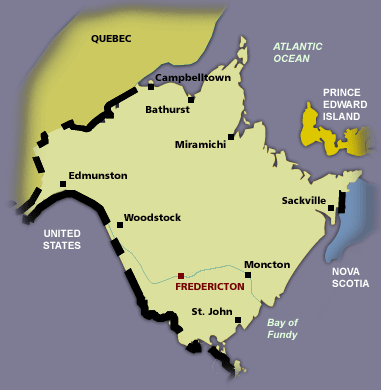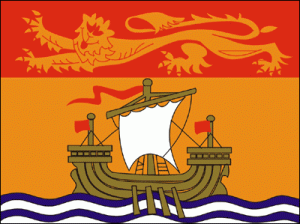New Brunswick
Pray:
- Pray for the Aglow groups and leaders to be strengthened.
- Pray for all the resources and creativity needed to fulfill the intentions of God in the province of New Brunswick.
- Pray for the Aglow prayer group in the Capital city.
- Pray for godly government leaders. Blessed is the nation whose God is The Lord, the people whom He has chosen for His own inheritance. Psalm 33:12
Proclaim:
- Arise, shine; for your light has come! And the glory of the LORD is risen upon you. For behold, the darkness shall cover the earth, and deep darkness the people; but the LORD will arise over you, and His glory will be seen upon you. Isaiah 60:1,2 (NKJV)
- Lift up your heads, O you gates! Lift up, you everlasting doors! And the King of glory shall come in. Who is this King of glory? The Lord of hosts, He is he King of glory. Psalm 24:9-10 (NKJV)
Interesting Facts About New Brunswick
Government: The province of New Brunswick has a parliamentary form of government. The chief executive of the province is the lieutenant governor, who is appointed by the Canadian governor-general in council to serve a 5-year term. The lieutenant governor, representing the British crown, holds a position that is largely honorary. The premier, the leader of the majority party, is the actual head of the provincial government and presides over the executive council.
The Legislative Assembly contains 55 seats, including those of the premier and the members of the executive council. Members of the legislature are popularly elected to a 5-year term; however, the lieutenant governor, on the advice of the premier, may call for an election before the term has been completed. The province of New Brunswick is represented by 10 senators appointed by the Canadian governor-general in council and by 10 members in the House of Commons popularly elected to serve terms of up to five years in the Canadian Parliament.
People: New Brunswick is Canada’s only officially bilingual province, with the highest percentage of Francophones outside Quebec (almost 35 percent), The heritage of New Brunswick combines French, British Loyalist, Scots and Irish traditions, with later elements of German, Scandinavian and Asian. The Aboriginal people of New Brunswick number more than 12 000, most of them Mi’Kmaq and Malecite.
History: Through time immemorial New Brunswick was home to Maliseet (Malecite) and Mi’Kmaq (Micmac) Indians who hunted, fished, grew corn and squash along the riverbanks. The Europeans knew it as early as the 1400s, when Basque fishermen fished off the Grand Banks. Jacques Cartier visited the east coast of present-day New Brunswick in 1534. The Mi’Kmaqs received Champlain and the French when they landed in New Brunswick in 1604. The French settlers who came and settled the area became known as the Acadians.
France and Britain feuded over the area for over a century. Control of the area passed back and forth between the British and French until the Treaty of Utrecht in 1713 when modern New Brunswick became part of the French province of Acadia. In 1755 the British again defeated French forces and extended British rule to the area. In the same year the British expelled the Acadians from Nova Scotia – 500 of the deportees settled in present day New Brunswick.
In 1762 the first British settlement in New Brunswick was established at Saint John. In 1783, in the aftermath of the American Revolution, the western part of Nova Scotia became the home of thousands (14,000) United Empire Loyalists. These American colonists, wishing to remain faithful to the British Crown, founded communities in the northern part of the province. In 1784, New Brunswick became a separate colony from Nova Scotia. In 1867, New Brunswick joined with Nova Scotia, Lower Canada (Quebec) and Upper Canada (Ontario) to form the Dominion of Canada under the terms of the British North America Act of 1867.
At the beginning of the 20th century, New Brunswick saw and the collapse of the wooden ship industry. Pulp and paper then became the backbone of the New Brunswick economy. Hydroelectric resources, mining and agriculture also took on a more important role.
Interesting Facts information from the library.educationworld.net/canadafacts website. Read more about New Brunswick


